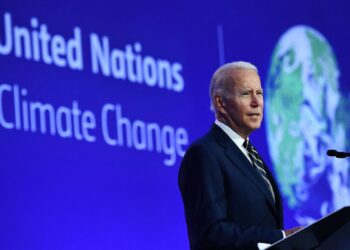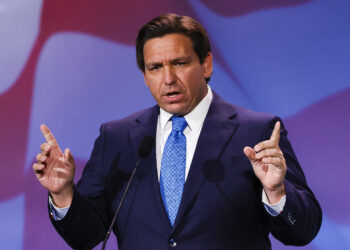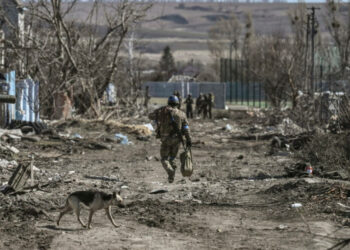With the U.S. killing of Iranian General Qasem Soleimani, tensions between Washington and Tehran have crossed a new threshold. Retaliations and counter-retaliations may increase the already growing pressure in the Middle East.
The increasing polarization can force regional actors to choose a side between Washington and the “resistance axis,” consisting of Iran, Hezbollah, the Syrian regime, and other Iranian-backed groups. One of the most critical regional actors in this polarization is Turkey, a NATO ally that also retains close ties with both Moscow and Tehran.
The recent escalation provides Ankara with the unique opportunity to restore its deteriorating relations with Washington. However, the Turkish government’s lack of strategy may hamper its shot to seize this chance.
Tens of thousands are now rallying against the United States in Tehran.
Donald Trump has made sure the people of Iran hate us, and pushed their government into a position where they feel forced to retaliate.
He is unfit to be our Commander in Chief.pic.twitter.com/nvgm1YCnkw
— Read Let This Radicalize You (@JoshuaPHilll) January 3, 2020
Still, the growing U.S.-Iran tension is good news for Turkey in several ways. Turkey is not a country to mourn Soleimani or other Iranian casualties, and there has been a long-standing geopolitical rivalry between these two countries.
Ayatollah Ali Khamenei’s long arm in Iraq, Syria, and Lebanon has been a serious concern for Ankara for years. After all, Iranian militias played a crucial role in the failure of the Syrian revolution that Ankara had fervently supported. Therefore, any block on Iran’s expansionism is a strategic gain for Turkey.
US-Turkey Ties
Yet, this escalation has a more important consequence for Turkey. It has put the Middle East high on the White House’s agenda again. Donald Trump’s isolationism and desire to stay away from the Middle East troubles were damaging Washington’s ties with regional allies. But as a result of the recent crisis, the Pentagon decided to deploy 3,000 additional troops to the region.
If tensions continue to increase, the Trump administration will certainly allocate more resources and reaffirm American commitment to its activism in the Middle East. Consequently, Washington will want to see NATO ally Turkey by its side. This strategic requirement, together with the personal chemistry between Trump and Turkish President Recep Tayyip Erdogan, can facilitate rapprochement.

As a matter of fact, back in 2011, the Arab Spring caused another episode of American re-engagement with the Middle East, and it helped Ankara to repair its upside-down relations with Washington.
Right before the popular uprisings, Turkish-American relations had been going through a difficult period because of Turkey’s crises with Israel and its cordial ties with Iran. In 2010, when the U.N. Security Council voted to impose a fourth round of sanctions on the Iranian regime, Turkey shocked U.S. policymakers by voting against the sanctions.
However, at the end of 2011, the Turkish-American relations reached an extent not seen for nearly a decade thanks to the cooperation between Ankara and Washington made possible by the Arab revolutions. The increased collaboration even made Ankara easily allowing the establishment of a radar system on its soils as protection of Europe against Iran.
Turkey’s Foreign Policies
From U.S. efforts to shape an anti-communist bloc in the Middle East to U.S.-led International Coalition’s operations against ISIS, Washington’s engagements in the region helped Ankara to emphasize its importance as a NATO ally.
In this respect, Trump’s decisiveness to use force to discipline Tehran can lead the U.S. and Turkey to cooperate by living down the recent crises that damaged the relations. Turkey is a significant regional partner with the ability to isolate Iran in the region.
On the other hand, it would be too naïve to think that Ankara will find the true rightful way and side with Washington against Iran. The major problem with Turkish foreign policy is a lack of strategy and coherent foreign policy. Erdogan’s character is decisive in this; he might be an excellent tactician but is a poor strategist.
Since the 2016 coup attempt, Erdogan has been trying to maximize his gains through pragmatism, short-term bargaining, and hard maneuvers between rival alliances. Thereby, he has succeeded in securing concessions from both Washington and Moscow. It allowed the Turkish government to carry out three cross-border operations in Syria, buy Russian-made S-400 air defense systems, and avoid American sanctions.
Nevertheless, Turkey has destroyed its credibility and lost the trust of its allies. Throughout the history of Turkey’s ties with the West, there are several instances in which Ankara diverted from its allies and experienced problems.
Yet, these problems had never reached a point of throwing suspicion on Turkey’s place in the Western bloc. But today, many in the West do not consider Ankara an ally. Even worse, Russia and Iran also don’t see Turkey as a trustable partner. None of the traditional alliances or emerging political blocs view Ankara as a reliable actor.
Ankara’s Short-Sighted Approach
It is possible to see Ankara’s short-sighted and opportunist approach in almost every issue. In Syria, while Turkey is a part of the Astana peace process launched by Russia and Iran, it also tries to take place in partnerships led by the United States. In its relations with the West, it tries to act as a Western ally, whereas in Tehran or Moscow, it becomes a revisionist actor.
In short, hypocrisy, greed, and opportunism drive Ankara’s foreign policy rather than long-term strategies, policies, or principles.
This is the reason behind Ankara’s long silence and murmuring words in the wake of Soleimani’s killing. The Turkish government waited 9 hours to make a low-profile statement.
#Turkey's statement on #US military operation killing #Soleimani https://t.co/okjc14s3oO pic.twitter.com/oTuTR8QmMt
— Benjamin Nussberger (@bknussberger) January 3, 2020
Apparently, both Washington and Moscow, as well as Tehran, want to see Turkey on their side. Iranian President Hassan Rouhani called Erdogan to urge him against the United States. Moreover, Tehran’s threats against the “American allies” in the region is an intimidation for Ankara.
Iran’s attacks on U.S. military bases in Iraq on Tuesday coincidentally happened a few hours after Russian President Vladimir Putin’s landing in Turkey. Erdogan’s ultra-nationalist partners within the country have been pushing him to side with Moscow and Tehran.
Meanwhile, Secretary of State Mike Pompeo reiterated to his Turkish counterpart Mevlut Cavusoglu the importance of stopping Tehran. However, Erdogan will hardly choose a side and embrace a coherent policy. Instead, the Turkish government will keep trying to stay ambiguous, maintain its advantageous position but losing its credibility.
Disclaimer: The views and opinions expressed here are those of the author and do not necessarily reflect the editorial position of The Globe Post.






















